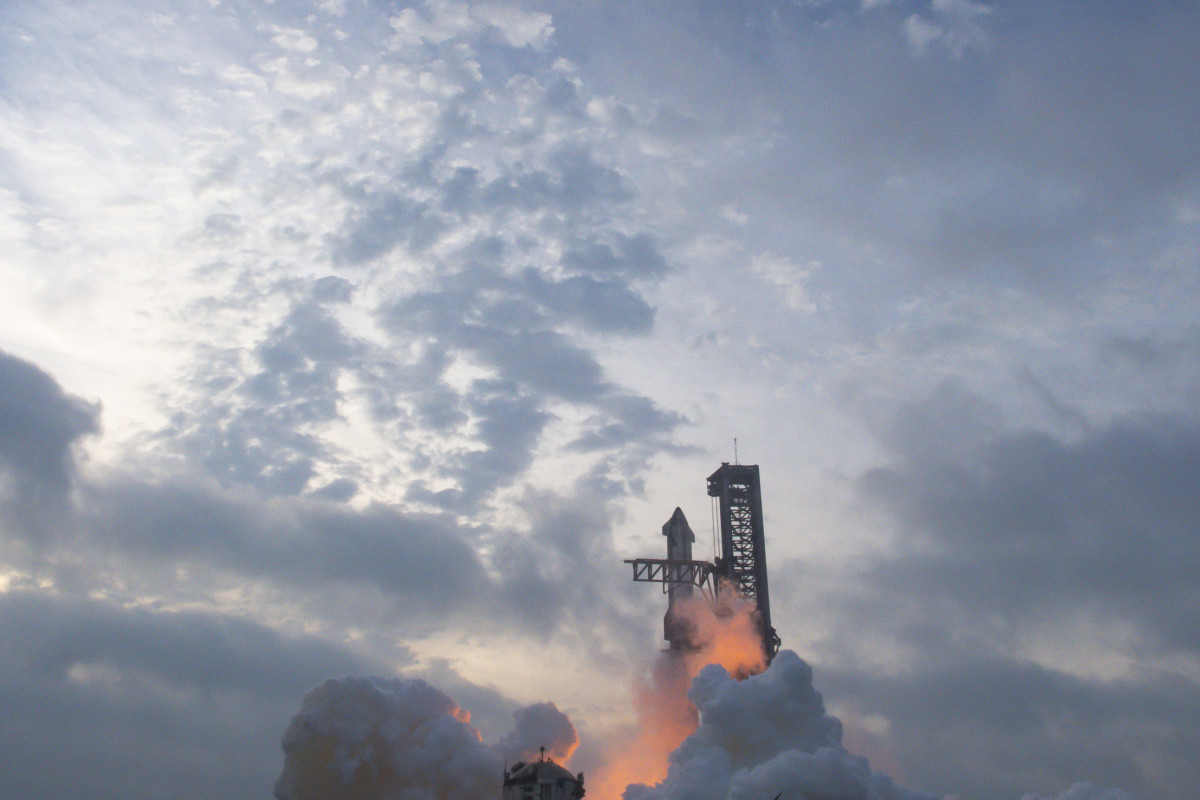
Fast Facts
- Elon Musk's Starship rocket flew for an hour before breaking up over the Indian Ocean.
- The European Commission has requested information from Google Search and Facebook, among other platforms.
- New York Times requests the denial of OpenAI's motion to dismiss.
Good morning and welcome to Tech News Now, TheStreet's daily tech rundown.
In today's edition, we're covering SpaceX's mostly successful third test flight of Starship, which TheStreet covered live on Thursday.
We're also covering the European Commission's latest requests for information from a series of "very large" online platforms, the New York Times' response to OpenAI's motion to dismiss and Amazon's latest move in expanding the routes of its autonomous taxi unit in Las Vegas and California.
Tickers we're watching today: (TSLA) , (GOOG) , (AAPL) .
DON'T MISS: Check out TheStreet's live coverage of SpaceX's third Starship test flight.
It's almost the weekend. Let's get into it.
Related: Watch Elon Musk's SpaceX launch Starship: Third time's the charm
Starship and only a little mishap
On Thursday morning — after being tied up in regulatory proceedings since November — SpaceX's third integrated test flight of Starship made its way off the launchpad and into space.
This third test of the rocket was far more successful than either of the previous two test flights, each of which ended in mid-air explosions a few minutes after clearing the launch pad. All told, Starship flew for about an hour, allowing SpaceX to achieve several objectives it had set for the test.
These included the opening and closing of the payload door, which will be used to deliver Starlink satellites, the hot-stage separation, a propellant transfer demonstration and the re-light of the vehicle's engines while in space.
The only objective Starship didn't achieve was the engine re-light, something it chose to skip during the flight.
In the end, the vehicle broke up over the Indian Ocean right at the end of its flight. The Federal Aviation Administration (FAA) said in a statement that no injuries were reported as a result of the explosion. The FAA will be overseeing a standard mishap investigation into the explosion; SpaceX won't be able to fly Starship again until the investigation has concluded.
It is also worth noting that, while the number of rockets launching around the world might seem insignificant, that number has been steadily rising (pushed along by Elon Musk and SpaceX) and that increase in rocket launches has environmental sciences concerned about the impact this will have on the environment.
The issue is that, even in small numbers, rockets inject soot and chemicals into the upper layers of our atmosphere, a combination that increases the warming of those layers (soot hangs in the air for a long time, and absorbs sunlight).
Related: The environmental dichotomy of Tesla CEO Elon Musk
The European Commission is looking into Google Search
The European Commission's Digital Services Act (DSA) entered into force last August. The Act designates certain platforms and search engines (with more than 45 million monthly users in the European Union) as "very large online platforms" — these platforms are required to acquiesce to the strictest obligations laid out in the Act.
Some of those obligations include independent audits, data sharing with the Commission and increased transparency, among others. Violations of the Act could lead to fines of up to 6% of global revenue, not exactly chump change for companies like Alphabet, which earned more than $300 billion in 2023.
Under the DSA, the Commission on Thursday sent requests for information to Bing, Google Search, Facebook, Instagram, Snapchat, TikTok, YouTube and X.
The Commission is looking for more information on how these platforms are mitigating the risks related to generative artificial intelligence, including hallucinations, automated manipulation and deepfakes.
The companies must provide all of the requested information by the end of April.
The Commission additionally sent a request for information to LinkedIn concerning the possibility of targeted advertising based on sensitive user data on the platform, a violation of DSA law.
Related: Big Tech clashes with Texas, Florida at Supreme Court
NYT responds to OpenAI's motion to dismiss
OpenAI last month requested a partial dismissal of many of the New York Times' claims against the company. In its motion to dismiss, OpenAI accused the Times of paying someone to hack ChatGPT in order to create the examples of copyright-infringing output that are referenced in the Times' original lawsuit.
The Times responded to the motion in a filing dated March 11, saying: "Lacking any real grounds for dismissal, OpenAI devotes much of its filing to grandstanding about issues on which it hasn’t moved."
The filing says that OpenAI's motion for dismissal "reads more like a spin than a legal brief."
Echoing a similar sentiment expressed by the Times' lead counsel last month, the filing dismisses OpenAI's accusation that the organization hacked ChatGPT, calling it "as irrelevant as it is false."
The filing goes on to explain that it prompted ChatGPT, work that the Times claims was only necessary because OpenAI will not share the details of its training set (something that the company's CTO doubled down on this week).
The filing later asserts that the Times' business model is built on "world-class journalism," while OpenAI's business model is built on "massive copyright infringement."
The Times called for the court to deny the entirety of OpenAI's motion.
"OpenAI’s true grievance is not about how The Times conducted its investigation, but instead what that investigation exposed: that Defendants built their products by copying The Times’s content on an unprecedented scale — a fact that OpenAI does not, and cannot, dispute," the filing reads. "Despite seeking to justify this conduct however it can, OpenAI does not move to dismiss the lead claim that it infringed The Times’s copyrights to train and operate its latest models."
Related: Here are all the copyright lawsuits against ChatGPT-maker OpenAI
Amazon's Zoox is expanding
Zoox, the autonomous taxi unit owned by Amazon (AMZN) , is broadening its horizons.
The company said in an announcement Thursday that it is expanding the virtual boundary that its vehicles operate within in Las Vegas, exposing the robotaxis to the "busiest conditions they’ve ever encountered."
The company also said that it is expanding its capabilities — all of its units, which are operational in California and Las Vegas — can now drive at speeds of up to 45 mph, in light rain and at night.
The company called the expansion a "big milestone."
Related: Here's what needs to happen to achieve safe self-driving cars
The AI Corner: The threat of Google's AI search
Big Tech is so excited about AI that they've been working to shoehorn the tech into as many different places as they can make it fit.
One of those places involves search, that wonderfully famous bar that allows us to access the incredible nightmare that is the internet, the lifeblood of modern society.
Google launched a beta version of its AI-powered search engine, something it called Search Generative Experience, in May.
A recent report from ad-sales company Raptive found that SGE could incite traffic declines between 20% and 60% for digital publishers, heavily disrupting the online publishing business.
Contact Ian with tips and AI stories via email, ian.krietzberg@thearenagroup.net, or Signal 732-804-1223.
Related: New platform seeks to prevent Big Tech from stealing art







